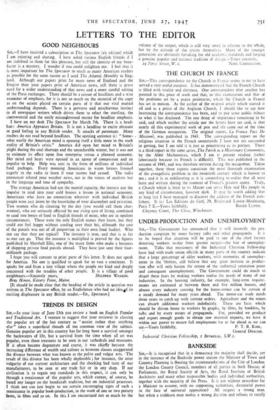LETTERS TO THE EDITOR
GOOD NEIGHBOURS
Sra,—I have received a subscription to The Spectator (air edition) which I am enioYing and sharing. I have asked various English friends if I am indebted to them for this pleasure, but still the identity of my bene- factor is a mystery. I wonder if you could enlighten me. I feel that it is Most important for The Spectator to reach as many American readers as possible for the same reason as I send The Atlantic Monthly to Fng- land. Although our papers print far more news of England and the Empire than your papers print of American news, still there is grave need for a wider understanding of that news and a more careful editing of the Press exchanges. There should be a censor of headlines and a wise examiner of emphasis, for it is not so much on the material of the copy as on the accent placed on certain parts of it that our vital mutual understanding depends. There is a perverse and mischievous instinct in all newspaper writers which drives them to select the startling, the controversial and the easily misunilerstood matter for headline emphasis.
I have on my desk The Spectator for March 7th. There is a head- line: America Appraises Britain. Ir is not a headline to excite pleasure or good feeling in any British reader. It smacks of patronage. Many readers do not read beyond headlines. The opening sentence is: "Some- what warily the American mind is opening itself a little more to the stark reality of Britain's crisis." America did open her mind to Britain's plight during the coal shortage and the unendurable winter, but it was not to estimate its effect upon free enterprise versus a planned economy. Her mind and heart were opened in an agony of compassion and an impulse to help. Help was sent in the form of millions of individual food packages. Every morning Americans in warm houses listened eagerly to the radio to learn if your storms had ceased. The radio announcer related your weather news, not in the voices of analysts but in the language and tone of sympathy.
The average American had not the mental capacity, the interest nor the impulse to read into your cold houses a lesson in national economy. Americans who have no connection whatever with individual British people were cast down by the knowledge of your discomfort and privation. Two women who do cleaning by the day (you would call them char- women), who are seriously affected by our rising cost of living, combined to send two boxes of food to English friends of mine, who are in opulent circumstances. These were the only English names they knew, but they could not feel happy without sending over their bit, although the cost of the parcels was out of all proportion to their own food budget. Who can say that they are typical? The instance is true, and that is as far - as one can go. That the instance is multiplied is proved by the figures published by Marshall Ellis, one of the many firms who make a business of shipping private food parcels abroad. They have just sent their four- millionth package.
I hope you will consent to print parts of this letter. It does not speak for Atnetica. No one is qualified to speak for so vast a continent. It speaks for and from a tiny village where the people are kind and deeply concerned with the troubles of other people. It is a village of good
neighbours.—Sincerely yours, /VIILDRED WASSON. Bray House, Kittery Point, Maine.
(It should be made clear that the heading of the article in question was written in The Spectator office, by an Englishman who had no idealpf its exciting displeasure in any British reader.—En., Spectator.]


































 Previous page
Previous page